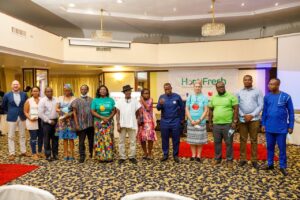Analysis of the fruit processing sector in the country has shown that the industry is being underutilized, as only about 62 percent of the total installed capacity is operational at peak production.
Research commissioned by the HortiFresh project has revealed that the installed capacity of the industry is estimated 2,240 metric tonnes (MT). However, about 868 MT, representing 38 percent of that capacity remains unutilized.
Again, out of the about 216 processing companies registered for both production for export & local markets, and production solely for local market, only 176 are still functional, as at the end of 2019.
The total installed capacity of solely local processing fruit juice companies, for instance, is about 330 MT per day, but they are currently producing at 142 MT, far below half of installed capacity.
It was observed that a myriad of challenges has contributed to the underutilization of these installed capacities by the various processors. Key among these factors are: raw material supply, price negotiations and payment terms, storage of fruits for processing, quality assurance, packaging and marketing.

Others are: poor choice of technology, absence of skilled technicians needed for maintenance and repair of spare parts, high production loses, unfavourable national regulations, cheaper imported fruit juices on the market, among others.
On the other hand, farmers are also not spared as their challenges impact the processors. Key among their challenges are: seasonality of fruit production due to inability to produce all year round, pest and diseases infections, lack of irrigation facilities to address drought and prolong the season, poor post-harvest practices, among others.
An Independent Consultant on the project, Pamela Okyere, who made this known at a forum to launch four new reports reiterated that fruit processors in the country are producing less than their installed capacities due to a combination of factors including delays in payment from buyers, quality standard issues and seasonality of the fruit supply to the companies.
Consequently, the majority of the processing firms are not able to raise enough funds to pay suppliers or service loans resulting in low production.
“The fruit industry covers key export commodities and offers great potential for contributing to Ghana’s effort at enhancing non-traditional export economy and for accelerating the domestic fruit processing sub-sector. However, the several production difficulties hindering processing and export activities must be tackled now by all hands-on deck approach.

Though the potential for growth in the fruit industry is still high, as fruit consumption continues to increase with growing middle class and heightened health awareness of consuming fruits and vegetables, coupled with the rise in fruit processing units, the fueling the market growth for fruits and vegetables, inability to deal with risk factors may act against the country,” she said.
The reports
The reports launched were: Fruit Processing in Ghana, Catalogue of Selected Indigenous Vegetables in Ghana, Pest Management Guide for Tomato and Pest Management Guide for Onion. The reports were presented to players operating in the various sectors of the industry to guide and make an informed decision.
Programme Manager, Hortifresh West Africa, Sheila Assibey-Yeboah, indicated that HortiFresh is all about promoting and sharing learning and knowledge, a factor that influenced the research project to identify the challenges in the fruit and vegetable sector and how best to address them.
“All the reports are highlighting the opportunities and warnings with regards to losing out on the foreign incomes the country realizes from exporting fruits and vegetables. We urge sector players to use these learnings to further enhance the sector,” she said.
Defunct processors
The Fruit Processors and Marketers Association of Ghana (FPMAG) indicated that out of the about 60 member companies, only about 20 are still operational. Most of the defunct processors could not break even and continue with their operations due to the identified challenges, stressing the need for a swift response.
Recommendations
The report recommended that funds for irrigation facilities should be made available together with the appropriate technical advice on best irrigation practices; investment in appropriate post-harvest storage and transport should be promoted with required technologies; seasonality of fruits alleviation through a mix of different varieties with different maturity times; and the control of pest and diseases through improved integrated pest management.










